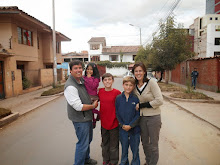 Leishmaniasis:
Leishmaniasis:In the United States, one of the most prominent markers of poverty is people's teeth (see great Malcom Gladwell article on this phenomenon -- http://www.gladwell.com/pdf/hazard.pdf). Poor people in the U.S. can rarely afford optimal dental care or braces. And a positive, attractive personal appearance is important for the social demands that middle and upper-middle class existence requires. In many parts of Peru, one of the prominent markers of poverty is a disease called Leishmaniasis (http://en.wikipedia.org/wiki/Leishmaniasis). It is contracted in jungle and tropical areas where poor people have to travel to find work and do not have sufficient resources and/or knowledge to sleep under tents at night and to work in areas where there are minimal mosquitoes and sandflies. Thus, they get bit by these insects and contract the parasitic disease, which leaves bloody scars and deformed faces (similar to leprosy). Someone who has contracted Leishmaniasis--and the scars that come with it--is said to have the "Mark of the Jungle."

Dr. Maria Cruz, one of our neighbors and the wife of Jose--the professor of ornithology who took Tim and me bird-watching--recently took me on a trip 2 hours east of Cusco to the town of Sicuani where she treats a large population of very poor Peruvians who have contracted Leishmaniasis during one of their work visits to the Amazon. One of the biggest problems with the disease is that most people do not know that Leishmaniasis is NOT contagious. Hence, people with the disease are often shunned and discriminated against. Fortunately, Dr. Cruz and her patients have formed an organization to change people's perceptions and to increase their knowledge of the disease. They are succeeding in many ways.


Given the negative public perception of Leishmaniasis, it is striking how starved for affection most patients with the disease are. I have rarely received so many hugs and handshakes in so short a period of time. On the ride home to Cusco, we brought 7 patients with us in our van, so that they could stay in an apartment in town and receive more aggressive therapy at the local medical school. This trip is made monthly by Dr. Cruz and is known to police officers who patrol the highway as the "Leishmaniasis Van." I was very proud and happy to have been permitted to ride in it and look forward to future trips!
The Burgess Family:
Last week we had the distinct pleasure of hosting the Burgess family (Andy, Brenda, Rachel and Nathan) from Richmond who are very close friends of ours. We have partnered with them for years with the college ministry at Third Presbyterian Church. And when we need a home to crash at during our homeless layovers in Richmond, they have always graciously allowed us to stay with them. Our beloved 1997, duct-taped Volvo station wagon is currently residing in their driveway. During their visit here, we took them to the local orphanage, El Arca, where we work, to church at our boys' elementary school, and to the local village of Pisac. They traveled on their own to Machu Picchu and Lima. Their visit was a joy for us. They also brought brown-sugar, new Legos for the kids, and books and documentaries!

 May (and June) Terms:
May (and June) Terms:Next week 11 University of Richmond students arrive in Cusco for a 1-month summer study abroad program on "Global health, Pediatrics and Human Rights" with me. Jen and I are very excited to host them and initiate this new summer program at UR. The students will take Spanish lessons in the morning, volunteer at the orphanage, elementary school and anyplace else they like in the early afternoon, and then take the global health class with me in the late afternoon. We will make trips to Quillabamba, Machu Picchu, and other destinations in the area. They will be staying at a hotel in the nearby farming village of San Jeronimo (near the school and orphanage). When they depart in mid-June, a new group of 12 UR students will arrive for a June Term of the same program.


 You may be aware of micro-credit financing, a world-wide phenomenon that is a popular and effective link between the developed and developing worlds. The concept behind micro-credit financing is that those of us with resources can loan money to people without them, interest-free, to help them start their small businesses. We are able to give these people an opportunity they otherwise would not have; they pay back the loan and are on their way. Two well known models are the Grameen Bank (http://grameen-info.org/) and KIVA (http://www.kiva.org/).
You may be aware of micro-credit financing, a world-wide phenomenon that is a popular and effective link between the developed and developing worlds. The concept behind micro-credit financing is that those of us with resources can loan money to people without them, interest-free, to help them start their small businesses. We are able to give these people an opportunity they otherwise would not have; they pay back the loan and are on their way. Two well known models are the Grameen Bank (http://grameen-info.org/) and KIVA (http://www.kiva.org/).








